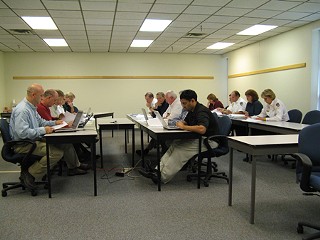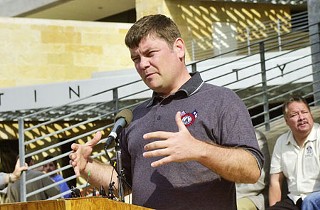Contract Kumbaya: The City and the Firefighters
By Michael King, Fri., Oct. 16, 2009

Last November, when the Austin Firefighters Association voted overwhelmingly to reject the labor contract negotiated between its union team and the city, it was the culmination of several months of tension, primarily over the question of "diversifying" the Austin Fire Department – how to make department personnel be more representative of the community they serve. Shortly thereafter, city officials declared that they had met their obligations under "meet-and-confer" standards and would not be returning to the table until after this year's budget cycle; the union responded that the city had thereby only confirmed that from the beginning it had approached negotiations in "bad faith." (See "Disagreeing to Agree," Jan. 16.)
It was not an auspicious moment, nor one likely to raise expectations that whenever negotiations finally did resume, the road to a new contract would be anything less than rocky.
Nearly a year later, after several weeks of renewed negotiations, it's surprising to hear both sides saying they're optimistic that a satisfactory deal will be reached by the end of October, or even sooner. Meetings at the city's Learning and Research Center, near the airport, are proceeding this week, and there remain nettlesome differences to be resolved that could stall an agreement. But recently, AFA President Stephen Truesdell acknowledged that in the negotiations "the mood and atmosphere have been better this year," giving him reason to hope that a reasonable agreement is within reach. The city's recently hired labor relations officer, Larry Watts, was similarly optimistic: "My sense is that it's going extremely well."
How is it that only a few months after negotiations had irretrievably broken down, the two sides are (at least for the moment) singing "Kumbaya" about reaching a contract? To some degree, the participants credit the stalemate itself – and more specifically, the firefighters' rejection of last year's contract – for motivating the change. "It's disconcerting at the least when a contract is rejected," said Watts. "To that extent, both sides came to the table hoping to find some middle ground where we could make this thing work. So both of us have tried to listen to the concerns of the other side, and to try to figure out what we can do to address those concerns, on hiring and on all the issues. So to some extent, the rejection of a contract causes both sides to come back and try harder."
AFA Secretary Bob Nicks offered a similar judgment, albeit with a different emphasis. "I think the fact that we made a stand on principles meant something. When you've got a group that's willing to walk away from the table and say, 'No, that's not acceptable,' it buys you a little leverage next time around." Indeed, the union's negotiators had split over last year's contract proposal, and Nicks was among those who successfully encouraged the members to reject it – though he did confess surprise when the city then refused to return to the table. Truesdell supported last year's contract proposal, but he agrees that whatever the impetus, the extended break seems to have enabled a new atmosphere in the current negotiations. "The extended hiatus gave both sides the opportunity to reflect," Truesdell said. Moreover, he said, the lack of a contract (and instead the default to general civil service law) makes workplace rules uncertain for management as well as labor. "Both sides want [a contract]," Truesdell concluded, "because it's always much better when things are well defined."
So motivation for an agreement is strong, although negotiations could still founder. The most contentious issue has not been wages but hiring procedures: City management was determined to win "flexibility" in order to ensure greater diversity, and the union was just as determined not to allow management to hire whomever it pleased without any common performance standards. It's hardly a unique issue; like the Austin Fire Department, fire departments nationwide trend overwhelmingly white and male, and a New Haven lawsuit on the issue recently reached the Supreme Court.
This time around, both sides say they've made great progress on the hiring issue. Watts was reluctant to describe still-tentative details, but said in general, "The firefighters are indicating that they are willing to give us a fairly high degree of flexibility, as long as we're willing to give them some assurance that we're going to have a legitimate process to hire firefighters." Truesdell and Nicks concurred, and Nicks (who had been in charge of training for the Austin Fire Department) said that joint city-union teams recently visited Memphis, Tenn., where they've made a lot of progress on these issues. Thus far, he said, "They're kind of heading that way with the hiring, and so I'm pretty excited about it."
A related dispute had arisen over Chief Rhoda Mae Kerr's recent appointments of new assistant chiefs. Truesdell pointed out that any "officer" – a staffing category that includes nearly 200 firefighters – was, in principle, eligible for one of those positions. "We prefer an open process with a full opportunity for everybody to apply, and standard criteria," he said, "as opposed to an arbitrary appointment." That's among the issues still being negotiated this week.
Although she was not on board for last year's negotiations (she took office in February, after the impasse), Kerr has been present for some of this year's sessions. As she left the Learning Center recently, she declared herself "extremely optimistic and extremely positive. ... At the end of the day, we both want the same thing: a high level of service and a process that we can have confidence in."
Got something to say on the subject? Send a letter to the editor.









